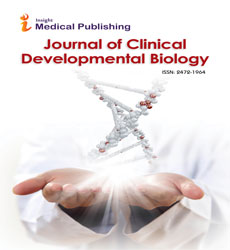Does Bevacizumab Plays a Proper Role in Treating Patients with Non-Small Cell Lung Cancer (NSCLC) ?
Xiaoshen Zhang, Siyu Zhang, Xiangyu Yao
Xiaoshen Zhang*, Siyu Zhang and Xiangyu Yao
Tongji University Cancer Institute, Tongji University School of Medicine, Shanghai 200092, PR China
- *Corresponding Author:
- Xiaoshen Zhang Tongji
University Cancer Institute, Tongji University School of Medicine, Shanghai 200092, PR China
Tel: 86-15221517298
E-mail: beakham13@126.com
Received date: December 17, 2015; Accepted date: December 24, 2015; Published date: December 29, 2015
Keywords
Non-small cell lung cancer; Bevacizumab; Elderly tolerability; Costeffectiveness; Adverse events.
Bevacizumab, as a humanized monoclonal immunoglobulin G (IgG) antibody, inhibits all active isoforms of VEGF, which has been bringing many clinical advantages to the treatment of NSCLC. Although worldwide clinical trials has provided promising findings on the efficacy of bevacizumab in treating the NSCLC either in combination or in single use, several perspectives should be further discussed and emphasized.
Firstly, two clinical trials revealed that the addition of bevacizumab would increase the overall incidence of grade≥3 adverse events [1,2], and the incidence of some severe condition such as hypertension and hemorrhage were especially greater in those aged 75 years or above (P<0.05). What exact medication should bevacizumab to combine with to reduce the adverse events? Thus, further studies ought to focus on the incidence of adverse events especially in elderly patients, and validate the possible mechanism in order to extenuate it during clinical practice.
Secondly, the drug tolerability of the elderly remains controversy. According to a recent study, [3] the poor compliance and toxicity of elderly patients whose age are up to 70 years are validated, which indicates that elderly patients with NSCLC may have treatment disadvantages comparing to younger counterparts. The results show that elderly patients were less likely to receive bevacizumab (7.5% vs. 21.3%), comparing with the non-elderly group. Also, two clinical trials reveals that the addition of bevacizumab will increase the overall incidence of grade≥3 adverse events, and the incidence of some severe condition such as hypertension and hemorrhage are especially greater in those aged 75 years or above (P<0.05) [1,2]. Consequently, the dosage and eligibility criteria should be adjusted to fit the elderly patients’ condition.
Thirdly, The cost-effectiveness is also an essential component for economic evaluation in the future clinical practice, due to the fact that recent clinical NSCLC guidelines were based on no costeffective strategies. According to a research conducted by Gayathri Kumar et al. [4], bevacizumab combination group(bevacizumab, carboplatin, paclitaxel) is in the list of most expensive medication regiment in US. In the study, this combination accounts for the largest cost in long term follow up costs ($31471.29), adverse event costs ($20159.77), acquisition costs and administration cost for induction ($35735.79/$1966.07), acquisition costs and administration cost for maintenance($29556.05/$1002.96) and post discontinuation therapy costs ($15596.30). Also, bevacizumab dominates the top of the list of price per unit, possessing $620.89/100mg. The high cost will surely add disadvantages to the drug’s extensive usage, making the medication less accessible to patients.
In summary, although the use of bevacizumab may have a positive influence on the treatment of NSCLC, some questions still remain. What exact medication should bevacizumab to combine with to reduce the adverse events? Comparing to some targeted therapy medication, such as cetuximab and cixutumumab, bevacizumab seems to be the better choice for NSCLC patients [5]. Can bevacizumab be replaced by other state-of-art medication in order to achieve a better therapeutic effects and assuring safety outcomes? Future studies are needed for clinical oncologists to focus on these issues.
Acknowledgements
This study is funded by National Science Innovation Training Project (No.201510247129).
References
- Langer CJ, Socinski MA, Patel JD, Sandler AB, Schiller JH, et al. (2015) Isolating the Role of Bevacizumab in Elderly Patients With Previously Untreated Nonsquamous Non–Small Cell Lung Cancer Secondary Analyses of the ECOG 4599 and PointBreakTrials. Am J ClinOncol2015Jan 24 [Epubahead of print].
- Zhou C, Wu YL, Chen G, Liu X, Zhu Y, et al. (2015) BEYOND: A Randomized,Double-Blind, Placebo-Controlled, Multicenter, Phase III Study of First-Line Carboplatin/Paclitaxel Plus Bevacizumabor Placebo in Chinese Patients With Advanced or Recurrent Nonsquamous Non–Small-Cell Lung Cancer. J ClinOncol 33:2197-2204.
- BakogeorgosM, Mountzios G, Bournakis E, Economopoulou P, Kotsantis G, et al. (2015) Do elderly patients with non-small cell lung cancer get the best out of recent advances in first-line treatment? A comparative study in two tertiary cancer centers in Greece. J GeriatrOncol6:111-118.
- Kumar G, Woods B, Hess LM, Treatb J, Boye ME, et al. (2015) Cost-effectiveness of first-line induction and maintenance treatment sequences in non-squamous non-small cell lung cancer(NSCLC) in the U.S.Lung Cancer 89: 294-300.
- Hanna NH, Dahlberg SE, Kolesar JM,Aggarwal C, Hirsch FR, et al. (2015) Three-Arm, Randomized, Phase 2 Study of Carboplatin and Paclitaxel in Combination With Cetuximab, Cixutumumab, orBoth for Advanced Nonsmall Cell Lung Cancer (NSCLC) Patients Who Will Not Receive Bevacizumab-Based Therapy: An Eastern Cooperative Oncology Group (ECOG) Study (E4508).Cancer 2015 Mar 4 [Epubahead of print].
Open Access Journals
- Aquaculture & Veterinary Science
- Chemistry & Chemical Sciences
- Clinical Sciences
- Engineering
- General Science
- Genetics & Molecular Biology
- Health Care & Nursing
- Immunology & Microbiology
- Materials Science
- Mathematics & Physics
- Medical Sciences
- Neurology & Psychiatry
- Oncology & Cancer Science
- Pharmaceutical Sciences
